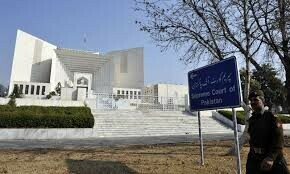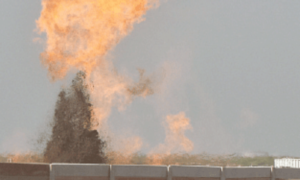• Judges seek reports from provinces on measures to counter environmental degradation, rising
pollution
• Justice Hilali questions effectiveness of Pakistan Environmental Protection Agency, other bodies
• Justice Afghan suggests promoting flats instead of housing societies to conserve farmland
ISLAMABAD: The Supreme Court’s constitutional bench, hearing 18 separate constitutional petitions initiated either on suo motu or human rights cases, focused its 110-minute proceedings on issues of environmental pollution while also addressing other pending matters on Thursday.
Headed by Justice Aminud Din Khan, the constitutional bench includes Justices Jamal Khan Mandokhail, Muhammad Ali Mazhar, Syed Hassan Azhar Rizvi, Musarrat Hilali and Naeem Akhtar Afghan.
On environmental pollution, the bench sought reports from all four provinces on measures to counter environmental degradation and rising pollution.
It recalled that in 1993, on a letter from Lord Nazir to then-chief justice Nasim Hassan Shah, the court had taken notice of several environmental issues, consolidating them for a unified hearing.
The bench directed federal and provincial authorities to submit their reports within three weeks, noting that the environmental pollution case could not be left unresolved indefinitely.
During the hearing, Justice Muhammad Ali Mazhar questioned how construction could proceed without clearance from the Pakistan Environmental Protection Agency (PEPA).
However, Justice Musarrat Hilali regretted that despite the presence of such agencies and environmental laws, housing societies were flourishing in the country.
She pointed out that in Khyber Pakhtunkhwa, marble factories operate close to school buildings, yet environmental agency officials fail to inspect these sites. “Smog has become a very big issue,” she remarked.
Justice Mandokhail sought clarification on the causes and remedies for smog, while the court was informed that PEPA had implemented several measures to comply with the court’s instructions.
Justice Mazhar then questioned whether it was the court’s responsibility to oversee environmental organisations, suggesting that if the court had to intervene on environmental issues, what was the purpose and need of such institutions.
Justice Naeem Akhtar Afghan raised concerns about the conversion of fertile agricultural land into housing societies, noting that Lahore’s city limits have expanded to Sheikhupura.
He similarly criticised unchecked housing development in Islamabad, which is consuming the capital’s agricultural areas. “Why not promote flats instead of societies?” he questioned, adding that unchecked development is detrimental to both agriculture and the environment.
The bench also addressed the ongoing power loadshedding issue, observing that it is a policy matter in which the court couldn’t interfere.
In a separate matter, the bench dismissed a 2018 review petition challenging the appointment of former CJP Qazi Faez Isa as the chief justice of the Balochistan High Court.
Advocate Riaz Hanif Rahi filed the review petition against a 2018 Supreme Court decision, which upheld Justice Isa’s appointment due to extraordinary circumstances, where all judges, including the chief justice, had resigned and the high court had become vacant.
“Now please leave the life of Justice Qazi Faez Isa,” remarked Justice Musarrat Hilali, warning the counsel against using the court platform for political speeches.
During the hearing, Justice Mandokhail suggested that Mr Rahi’s matter be referred to the Pakistan Bar Council for disciplinary action for filing frivolous petitions.
The court also dismissed Maulvi Iqbal Haider’s petition against his five-year ban from entering the Supreme Court and fined Mehmood Akhtar Naqvi Rs60,000 for baseless litigation.
Published in Dawn, November 15th, 2024









